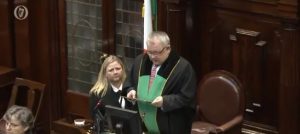
By Sean Ryan - 05 May, 2017
 The Dáil prayer is to continue after Fine Gael, with support from Fianna Fáil and independent TDs, voted to retain it.
The Dáil prayer is to continue after Fine Gael, with support from Fianna Fáil and independent TDs, voted to retain it.
Both parties, along with a number of independent TDs, voted to amend Standing Order 27 to keep the prayer, read in both English and Irish before Dáil business commences, alongside a new 30-second period for silent reflection.
Currently members of the Dáil rise to their feet for the Ceann Comhairle Seán Ó Fearghaíl’s entrance, and most remain on their feet for the prayer. Under changes approved this week, it will now be compulsory to remain standing.
Introducing the debate on the amendment, Minister of State Marcella Corcoran-Kennedy TD said it had been a topic of discussion for some time and that the “profile of the country has changed over the years”. She said the Committee on Procedure and Privileges discussed the matter in March and suggested amending the order to have a prayer and a silent reflection. The minister pointed out that the chamber reflects the population as a whole and it was not surprising that it has become a topic of discussion.
Fianna Fáil’s Mary Butler and Anne Rabbitte both said they would like to see the prayer retained, and welcomed the introduction of silent reflection time. Fianna Fáil’s Willie O’Dea has also said he would vote in favour of keeping the Dáil prayer, saying he uses those moments to pray for “guidance and wisdom”.
Opposing the move to retain the Dáil prayer, Sinn Féin’s Aengus Ó Snodaigh said the tradition “was only in existence as a legacy from the British parliament”. As an alternative to the prayer, Mr Ó Snodaigh called for “a moment’s silence so everyone could reflect on their religion or none”. He cited other parliaments where this is done, and pointed out that in Japan there was a 20-minute moment of silence to reflect.
Solidarity TD Ruth Coppinger described the proposal to keep the Dáil prayer as baffling. The Dublin West deputy said that at a time when the rest of society was demanding a separation of church and State, the Dáil was imposing the amendment.
Ms Coppinger suggested a room for people to go to in order to reflect because she said it was a private matter and the Dáil is a civic place.
People Before Profit’s Bríd Smith also opposed the retention of the prayer. The Dublin South Central TD said “a separation of church and State was necessary” and that “the country had moved on and requested that the House move with people and the times”.
Tipperary TD Mattie McGrath of the Rural Independent Group said the prayer was a “specific heritage to the country which the vast majority of people did not find offensive”. He said the Dáil’s “democratic structures should not be hostile to the process”. Mr McGrath said it was “a majority parliament and if the majority decided they did not want it, he would accept that”.
Twenty-four European parliaments have no prayers in the plenary, while Ireland remains one of six where prayer or reflection is observed in plenary. The UK, Australia, South Africa, Canada and the US also retain a prayer in parliament.